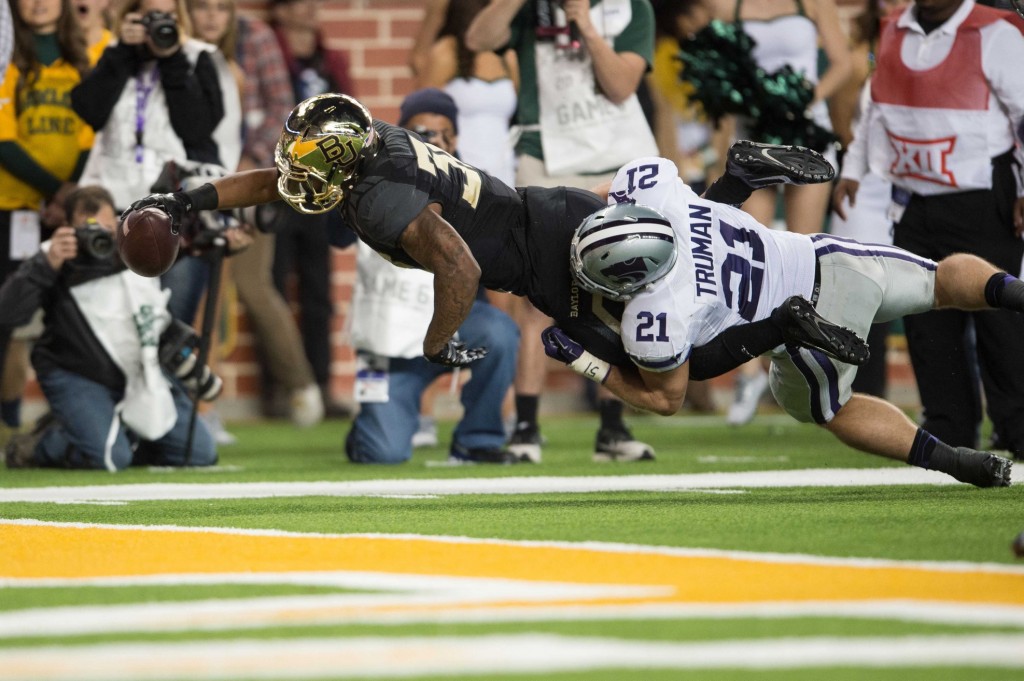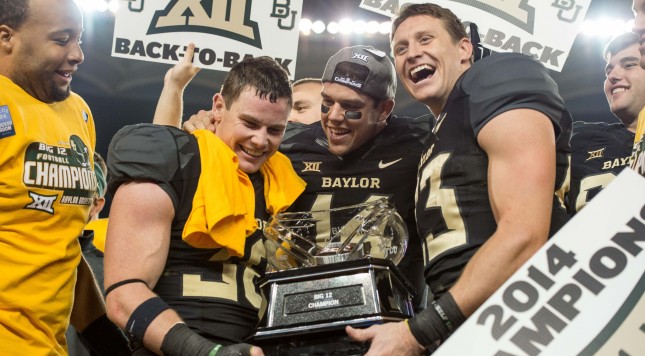The Baylor Bears defeated the Kansas State Wildcats on Saturday night in Waco, Texas, to finish with an 8-1 Big 12 record, atop the conference standings alongside the TCU Horned Frogs. You might have heard this at some point in the past week: Baylor beat TCU head-to-head. The score was 61-58.
Just wanted to make sure you knew, because really, there was a dearth of information circulating in the mass-media bloodstream on that issue over the past month…
At any rate, the finer details of Baylor’s win will not be remembered. Due to the full-tilt debate about the College Football Playoff — which will surge until the announcement of the four teams at 12:45 p.m. Eastern time on Sunday — this game faded away as soon as it ended. What immediately mattered was Baylor’s place in the playoff equation… and the Big 12’s contentious conference championship debate, which found two primary forms of expression:
1) the conference title game issue
2) what makes a conference champion
At The Student Section, we discussed issue number one earlier in the week.
As for issue number two, is TCU a conference champion? Is Baylor the primary or only champion of the league? Does it matter if you call the Frogs and Bears co-champions, sharers of a crown? Many groups of people have different opinions on these questions. Regardless of where you stand on the issue, take the time (when you have it) to explore this audit of conference championships in college football’s history. You might draw your own definitional boundaries elsewhere, but you owe it to yourself to explore why conference champions are different from national disputes, and why they are (and should be) decided in a way that’s different from choosing a team for a national playoff.
The playoff is its own debate — that will resolve itself in due time. The fascinating part of the Big 12 season is that the conference has become so conflicted about recognizing One True Champion or co-champions. This is the perfect time to explore that conference championship audit (linked to, above) and to think about proper boundaries in conference titles.

The BCS and the College Football Playoff are free to look beyond local boundaries and considerations when choosing their teams. A conference championship is not a political selection, though. There is an established way to break ties strictly within the parameters of a league or division. Baylor owned the first tiebreaker. This is not hard. It’s not.
*
A conference championship is not a political selection. It is not decided based on computer formulas or writers’ polls the way the BCS was. Conference championships are not decided by committees — not anymore, at any rate (the Big Ten used to decide which team would go to the Rose Bowl in the 1970s if a tie or dispute needed to be settled). What a team does in a conference is measured simply by the win-loss record. Teams don’t win conference titles because they win an eye test. They win enough games to win a division or, if there’s no division, the league itself. There are standings.
In a national competition, teams with two losses can get in over teams with one loss. If standings are what determine conference champions, though, you can see that there is no ability to evaluate based on a different metric. It is always about the standings. It is ONLY about the standings. If there’s a tie in the standings, decades — not a few years or months, but DECADES — of American sports have told us that existing or applicable head-to-head results break ties.
This is not a national resume question. This is not an eye test issue. This is about what two teams did in a conference, solely as a simple tabulation of their wins and losses. That’s what determines a conference champion.
There’s a difference between college football and basketball in this respect: In football, teams play each other once (save a league title game, if applicable). In basketball, teams will sometimes play each other twice in a season that’s more than twice as long as football. If you tie in the conference standings in football but own the head-to-head, the one-time nature of the competition should enable the winner to tout itself as the only conference champion, even while the losing team has a legitimate claim to a share. (I call that share a “minority share,” while the winner of the head-to-head owns the “majority share” of a split conference title.)
In basketball, the reality of playing a long season — and of double head-to-heads in some instances — means that a tie in the standings after 16 or 18 conference games should enable two teams to be co-champions, even if one owned the head-to-head edge. Sports are different, as football and basketball show, but in basketball, if Team A won the head-to-head during the regular season over Team B and the two teams tied at the top of the standings, Team A would be the No. 1 seed in the conference tournament. Team B would be the No. 2 seed.
This is how ties are broken. They’re broken this way in the NFL. They’re broken this way in the NBA.
Don’t look to national metrics to solve a local dispute. TCU and Baylor finished tied atop the Big 12 standings. Baylor won the game. You can argue that TCU should be taken ahead of Baylor for the playoff.
You cannot argue that TCU is as much of a champion as Baylor is.
A champion? Yes. TCU can be seen as that… but not a champion on equal standing compared to Baylor.
This is how conference championships work. This is how they have worked in American sports history (not exclusively, but mostly, in the modern era). This is how they should work.
Playoff or not, nothing can or should change the fact that Baylor has defended its Big 12 title from 2013.
*
For live-tweeting of this weekend’s big games, plus live analysis of Selection Sunday and the announcements of the bowl pairings, follow us on Twitter at @TheStudentSect.

